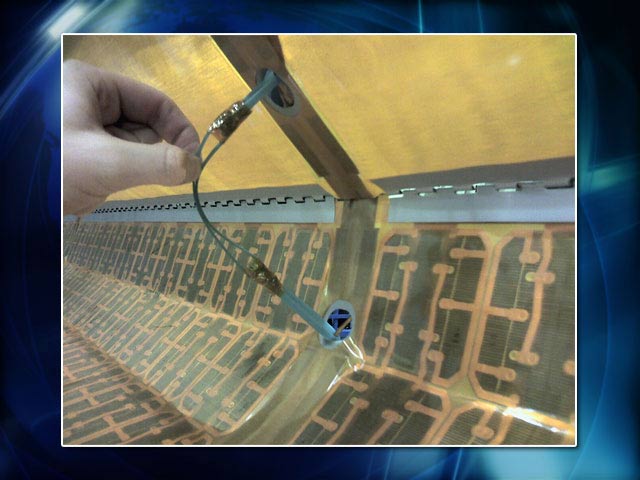Space Station Surgery: Astronauts Mend Torn Solar Wing

HOUSTON - Dangling on the end of a shakyrobotic arm today, a NASA astronaut rescued a torn solar blanket and ensured the short-term futureof the International Space Station (ISS).
Mission managers feared the crumpled, tornsolar wing would threaten the completion of the orbital laboratory, as thespace agency's aging space shuttle fleet is set to retire in 2010. With thearray now patched up and fully deployed, however, NASA mission managers haveone less power-managing headache to remedy.
Veteran astronautScott Parazynski led the unprecedented spacewalk, patching up the solar array atthe far end of the unfinished space station.
"Whatan accomplishment, beautiful," Parazynski said as he watched the freshlyrepaired array unfurl from his vantage on the end of an extended robotic arm. "It'sas taut as a sail. Everything looks completely intact."
SpacewalkerDoug Wheelock watched Parazynski traverse through space, ensuring robotic armoperators did not bump him into the electrified solar arrays during his45-minute journey.
"Thisis just beyond description," Parazynski said of his view of Earth duringthe ride to the damage site.
Crisisaverted
Get the Space.com Newsletter
Breaking space news, the latest updates on rocket launches, skywatching events and more!
Thetroubling solar wing, one of four anchored to the Port 6 (P6) solar array truss,snagged and tore about 80 percent through its deployment on Oct. 30. The damagecame just two days after astronaut Dan Tani discovered worrisome metallicshavings in a set of solar-array-rotating gears.
Missionmanagers huddled to decide which one of the problems most threatened thearrival of the Columbus module, which is scheduled to arrive in December on thespace shuttle Atlantis.
ISS leadflight director Derek Hassmann said yesterday that fixing the maimed solar wingwas priority number-one.
"Weneed to address one of these two problems before we proceed," Hassmannsaid. "The P6 solar array is the ... priorityproblem that we can go fix now."
Teams ofengineers descended on Johnson Space Center (JSC) in response, throwing aspacewalk plan together in little more than two days. Mission managers saidcomparative spacewalks take months to plan.
Dr.Spacewalker
Parazynski,also a medical doctor, endured the seven hour and 19 minute spacewalk withWheelock to revive the solar wing.
"It'sa bit of a reach here," Parazynski said as he reached out to clip frayedwires and stitch in five hand-made cuff links to strengthen the weakenedblanket.
"That'swhat those monkey arms are for," said Pamela Melroy, space shuttleDiscovery commander.
"Myarms are long, but not that long," responded Parazynski, also known as"Longbow," who is an impressive 6 feet, 2 inches.
Once the blanketwas sewn up, robotic arm operators Tani and Stephanie Wilson pulled Parazynskiaway from the array. Parazynski looked on as Mission Control deployed the solarblanket.
"Beautiful,"he said when the array extended to a full 110 feet (33.5 meters).
Missingtool
Parazynski and Wheelock's success was marred only by the loss of a pair of needle-nose pliers, whichdrifted away as they entered the Quest airlock.
Thespacewalking duo began the extravehicular activity (EVA) at 6:03 a.m. EDT (1003GMT), and endured seven hours and 19 minutes of time working in the vacuum ofspace. Parazynski now has 47 hours and 5 minutes of spacewalking time underhis belt while Wheelock now has 21 hours and 41 minutes.
Thespacewalk was the fourth and final EVA of the STS-120 mission and the 96th tobuild the space station.
Shortly afterParazynski and Wheelock climbed into the airlock, Melroy announced two awardsfor the star spacewalkers. The Order of Saint Michael-an impressive militaryaward-for Wheelock, and a less formal award for Parazynski.
"Scott,you never were able to get a medal at the Olympics," Melroy said ofParazynski's luge experience. "But I think everybody would say that youreceived the EVA gold medal today."
Spaceshuttle Discovery and its seven-astronaut crew is slated to undock with the ISSon Nov. 5 and land in daylight on Nov. 7.
- SPACE.com Video Interplayer: Delivering 'Harmony' with NASA's STS-120 Mission
- Looking Back on 50 Years of Spaceflight
- Complete Space Shuttle Mission Coverage
Join our Space Forums to keep talking space on the latest missions, night sky and more! And if you have a news tip, correction or comment, let us know at: community@space.com.
Dave Mosher is currently a public relations executive at AST SpaceMobile, which aims to bring mobile broadband internet access to the half of humanity that currently lacks it. Before joining AST SpaceMobile, he was a senior correspondent at Insider and the online director at Popular Science. He has written for several news outlets in addition to Live Science and Space.com, including: Wired.com, National Geographic News, Scientific American, Simons Foundation and Discover Magazine.









